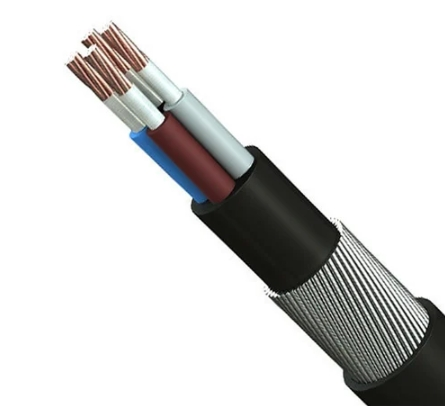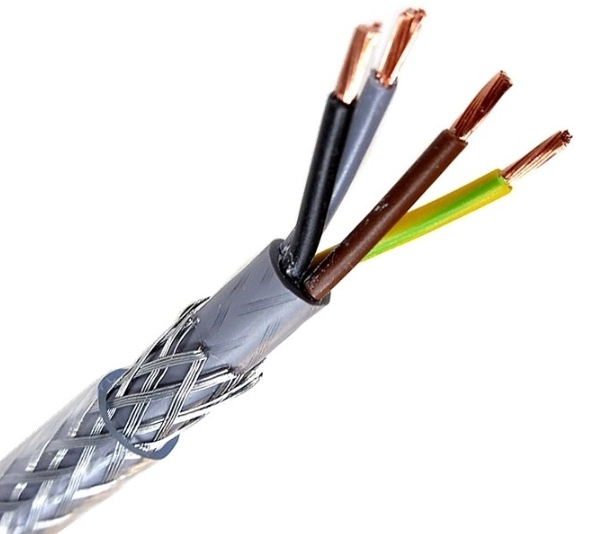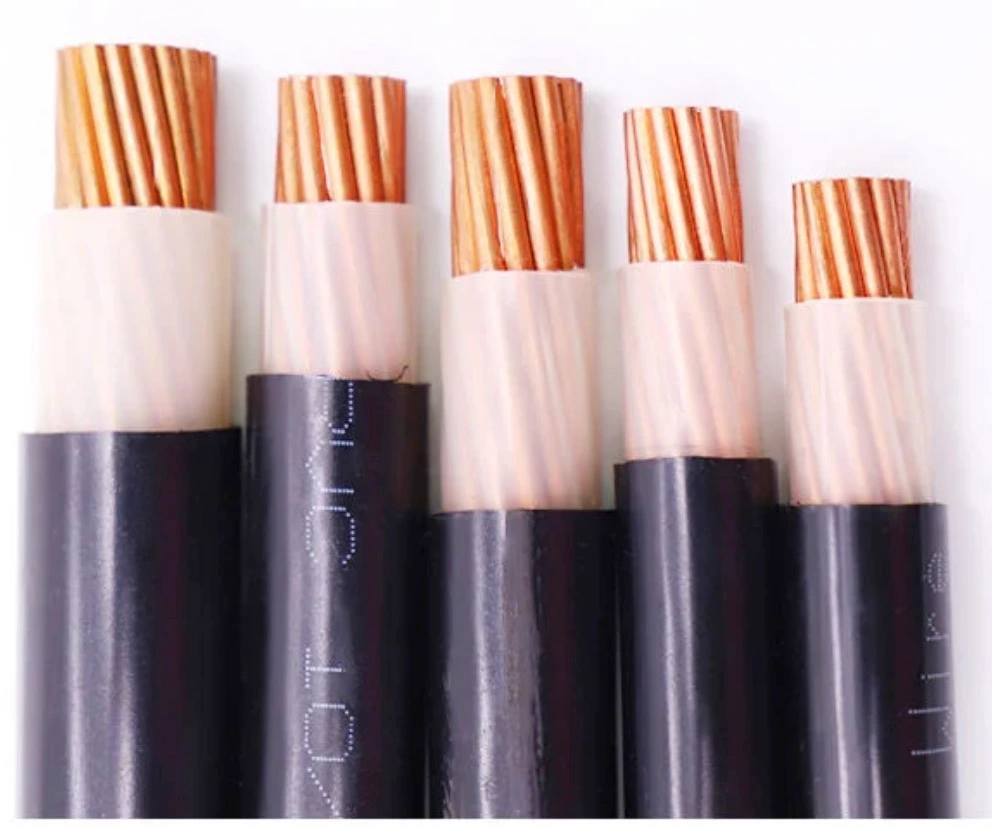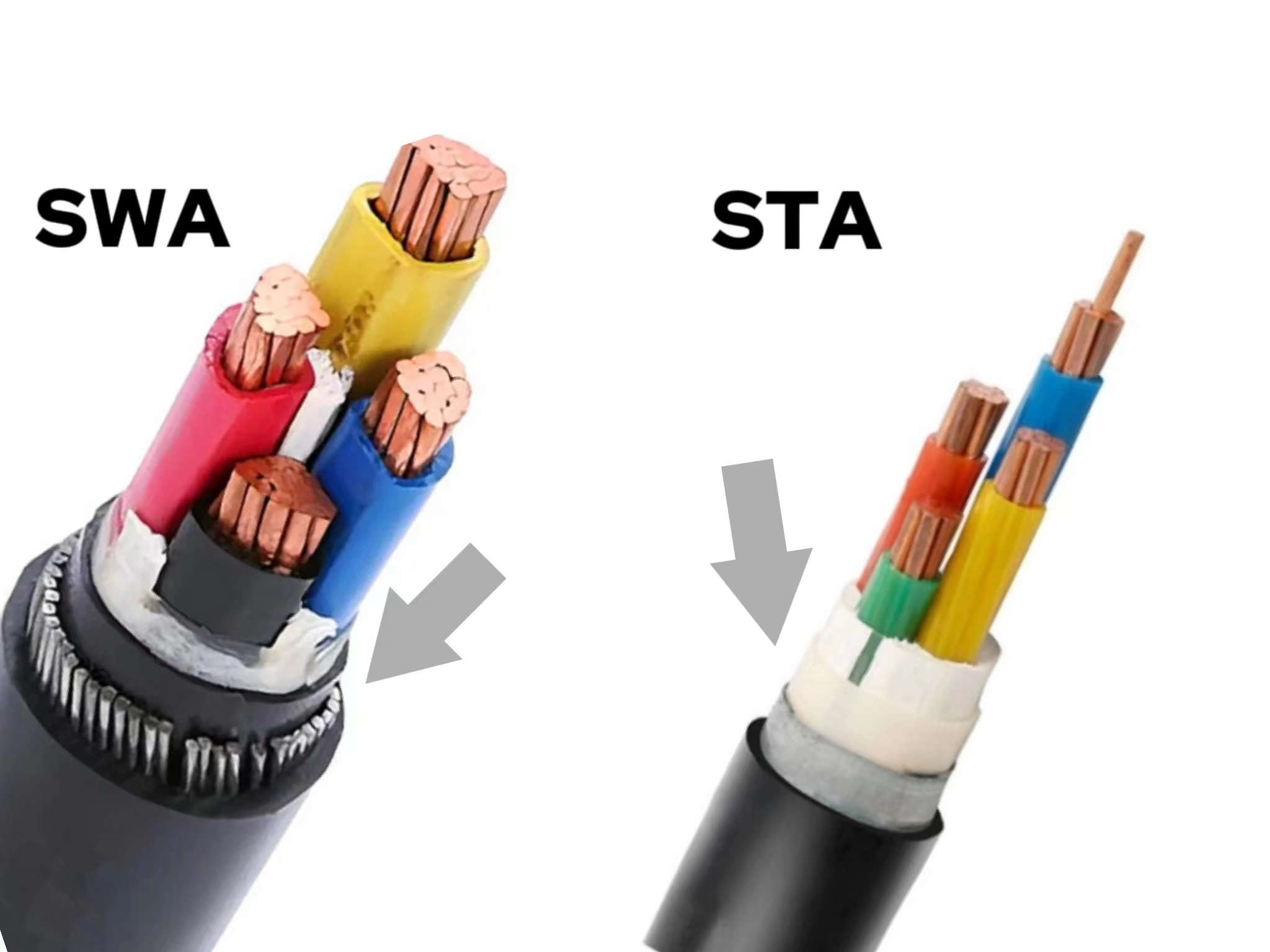Unlike ordinary electrical cables, except for the insulation and conductor, armoured cable add a armor layer that provides double-layer protection for electrical cables. The armor layer is usually made of steel wire or steel tape, which can prevent damage to the inner insulation and conductor of the electric armoured cable and ensure that electrical signals can be transmitted safely and reliably.
Armored cable consists of copper or aluminum conductors, xlpe insulation, steel wire or steel tape armor, and pvc sheath. We usually use them outdoors or in tough situations. The following is information about electric armoured cable, such as types of armed cable, armoured cable size, armoured cable colours, and so on. If you want to grasp it, please follow me.
Firstly, Let’s take a look at the types of armored electrical cables.
Types of armoured cables
The primary effects of armoured electrical cables are to enhance anti-tensile and anti-extrusion capabilities. They are also classified by the use of different metal clad, which are divided into three main categories. Armoured cable also called mc cable.
Steel wire armoured cable (SWA): The conductor of swa armoured cable is protected by steel wires on the outside and is also equipped with an insulation layer between steel wires. This kind of cable is also called swa cable.
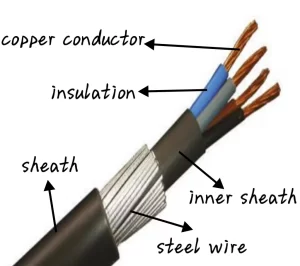
Steel tape armoured cable(STA): The structure is the same as swa armoured cable, except that steel tapes replace the steel wires outside the conductor. This kind of cable is abbreviated as sta cable.
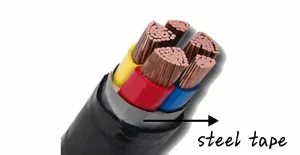
Aluminum wire armoured cable(AWA): The structure remains the same as swa cable, replacing steel wires with aluminum wire outside the conductor. This kind of cable is abbreviated as awa cable.
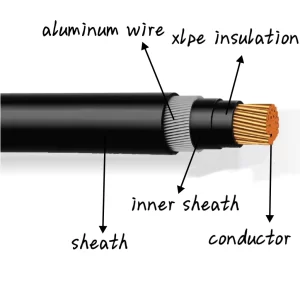
The voltage ratings of armored cable are usually 600/1000V, 6.35/11kV, 8.7/15kV, and 19/33kV. When selecting an armour cable, you should also consider which rated voltage you need.
After understanding the types of armad cable, we need to know where it can be used, how to wire it, and the reasons.
Where armoured cable is used and why also explain more about it?
Because armored cable has an armor layer to protect the cable from corrosion, it can be used in harsh environments. For example,
- Underground power cables: cables used for laying underground will be squeezed and eroded by the land for a long time, so special protection for cables is required, so armored cables are just suitable for underground power cables.
- Power distribution: The armored layer of the armored cable will make the current of the cable more stable and reliable, so the armored cable is also used in fixed power supply systems, power networks, etc.
- Construction field: Armored cables can be used in power distribution, lighting, communication, and data transmission. The armor layer can enhance the tensile and compressive capabilities of the cable.
- Chemical industry, metallurgy, oil and natural gas,and other industries: Due to the influence of factors such as high temperature, high voltage, and corrosive substances, will damage ordinary cables if they are corroded for a long time, so armored cables are needed to prevent corrosion and increase the use of cables time.
- Ships and marine fields: In humid environments, armored cables can resist moisture, seawater corrosion,and impact, so armored cables are also used in marine transportation, seabed exploration, and marine communications.
Armour cable is a cable with strong resistance to pulling and crushing, and it can adapt to any harsh environment. Steel wire armor has strong tensile strength and can be used for laying directly buried cables or general threading pipes, general roads, tunnel construction, etc., while steel tape armor has strong extrusion resistance and is suitable for the overhead or vertical laying of short-circuit lines.
Adding a metal-clad armor protective layer to the cable can prolong the service life of the cable, improve the anti-interference ability of the cable through shielding protection, improve the anti-corrosion ability of the cable, and prevent mice from biting.
After understanding the purpose of the armored cable and the role of the armored layer, let’s take a look at the armoured cable colors.
Armoured Cable Colors
Depending on the manufacturer and the exact application, armoured cables colors may change. However, armored cable’s outer sheath is often always black. This is because these hues are neutral and unobtrusive, making them appropriate for usage in a variety of settings. For certain uses, such as red for high-voltage power cables, some manufacturers may also offer armored cables with colored outer sheaths. It is crucial to remember that the performance and functionality of the armed cable are unaffected by the color of the outer sheath. Nevertheless, just like the inner sheath, there are default choices for the outer sheath’s color.
They are generally:
3 core armoured cable: Red, Green, Blue
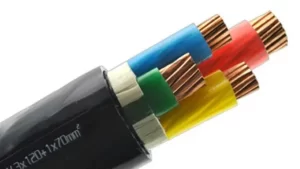
4 core armoured cable: Red, Green, Yellow, Blue
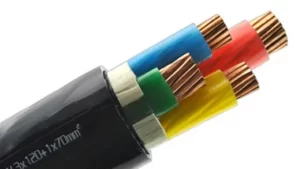
5 core armoured cable: Red, Green, Yellow, Blue, White
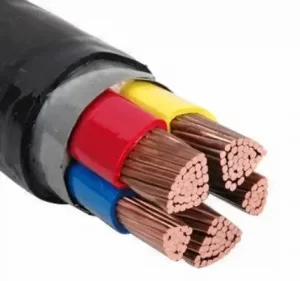
Of course, if the regulations are met, armored cable colors, including the inner sheath and outer sheath of armored cables can be customized. Customers can often receive customized armored electrical cable that meets their needs through communication with manufacturers.
Now that you have a certain understanding of the armoured cable colours, you can look at the armored cable size again.
Armoured Cable Size
For different application scenarios, flexible armored cable has different sizes. The conductor cross-sectional area of an armoured cable determines its size and current carrying capacity. The rated voltage will change in line with the size. The choice of armored cable size will also be influenced by other variables such as the length of the needed cable, temperature, environment, and voltage. In some regions, American Wire Gauge (AWG) is used. Below is a commonly used armoured cable size chart(mm²)
| Size | Nominal Thickness of Insulation (mm) | Under Armour (amps) | Armoured Cable Price (USD/M) |
|---|---|---|---|
| 2.5mm armoured cable | 0.7mm | 32 | $1.36 |
| 4mm Armoured Cable | 0.7mm | 41 | $2.2 |
| 6mm Armoured Cable | 0.8mm | 54 | $3.5 |
| 10mm armoured cable | 0.9mm | 72 | $5.5 |
| 16mm Armoured Cable | 0.9mm | 97 | $7.6 |
| 25mm armoured cable | 1.0mm | 122 | $11.5 |
| 35mm armoured cable | 1.1mm | 162 | $16 |
| 50mm armoured cable | 1.2mm | 204 | $22 |
| 70mm armoured cable | 1.2mm | 253 | $31.2 |
Of course, which size armored cable to use when purchasing, you should also ask the cable supplier or the local electrician to follow the relevant electrical standards.
Now, you have a sufficient understanding of armored cables. So can armoured cable be buried? It is a topic worthy of research.
Can armoured cable be buried?
Of course, some projects need to lay wires underground. At this time, the armored cable with strong tensile and extrusion resistance can give full play to its advantages. The metal clad can protect the cable from damage when it is buried in the ground. Over time, the sheath of the armored cable may be bitten by mice or damaged by soil erosion. The armored layer can protect and ensure Current is delivered normally. However, there are some requirements for armored cable wiring underground that need to be complied with.
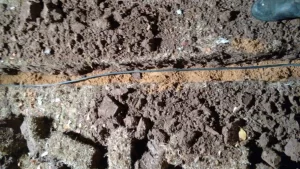
- The underground laying of armored cables requires sufficient depth. The depth of direct burial in the ground cannot be lower than 0.7m, and the depth when crossing farmland cannot be less than 1m.
- The bottom of the excavated ditch must be a soft soil layer (no stones or other hard substances) to prevent unnecessary damage to the armored cable.
- After the armored cable is laid, a layer of 100mm of soft soil or fine sand should be laid on it and then covered with a concrete protection board.
- There should be a pig iron or concrete protective box outside the cable intermediate joint box.
- A concrete foundation plate must be placed under the cable joint, and its length should extend about 600-700mm from both ends of the protective box.
- When passing through places without permanent buildings, stakes should be buried, and cable stakes should also be buried at joints and turns.
When laying armoured electrical cables, it is necessary to consult the local electrician or the manufacturer and supplier of armored cables to ensure safe and correct laying and, simultaneously, follow the local cable laying standards.
So, what is the distinction between armored cables and unarmoured power cables? Let’s talk about it.
Differences between armoured cable and unarmoured cable
The armoured cable should be utilized for a number of different reasons.
Firstly, the primary reason is strength, as armed cable is formerly utilized more frequently in harsh environments, such as the cable being buried directly beneath the ground rather than through a conduit. Nowadays, the majority of local governments mandate that conduits be trenched in before network components are installed, which eliminates the requirement for unarmoured cable in the majority of applications.
Second, since rats and other animals may and will eat through wires, the armor shields the cables from damage in direct burial applications caused by animals or digging.
Third, the most uncommon application is an RF setting when an off-air RF signal is strong enough to interfere with your network. In this case, the armour might add an additional layer of RF protection when grounded.
Simply to say, the armed cable offers more complete protection with the same electrical properties and performance as the unarmoured cable. Of course, armoured cable price also tends to be higher than unarmoured cables. Therefore, we can also use unarmoured power cables in a more stable usage environment.
Now that we grasp their difference, and then you must have a certain understanding of armord cable.
Conclusion
Armoured cables are widely used in power systems, and the application scenarios are varied. The unique structure of the armored cable improves the durability of the cable, better maintains the stability of the current, and is more flexible. This provides a reliable solution for people to use electricity better.
Notice, if you want to buy the right armord cable, you need to find a reliable supplier. ZW Cable is a very reliable manufacturer and supplier with first-class service, high-quality products, and reasonable armoured cable prices. In zw cables, you will gain what you need and a satisfactory result.


